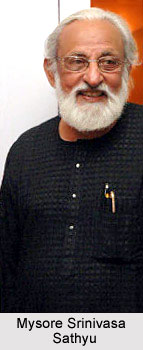 Mysore Srinivasa Sathyu was born in Mysore and that is the reason Mysore is there is his name. From his early childhood only he was attracted towards Indian theatre and Indian cinema. Born in 1930 he studied at a college Bengaluru and became trained in direction. He went to Mumbai in 1952 with the idea of finding employment as a technical assistant in films. Unsuccessful in this attempt, he turned to theatre, designing sets. In 1956 he got an opportunity to work as assistant director on Chetan Anand`s movie Anjali.
Mysore Srinivasa Sathyu was born in Mysore and that is the reason Mysore is there is his name. From his early childhood only he was attracted towards Indian theatre and Indian cinema. Born in 1930 he studied at a college Bengaluru and became trained in direction. He went to Mumbai in 1952 with the idea of finding employment as a technical assistant in films. Unsuccessful in this attempt, he turned to theatre, designing sets. In 1956 he got an opportunity to work as assistant director on Chetan Anand`s movie Anjali.
After a few years in Bombay, he left for Delhi and helped the fledgling efforts of Habib Tanvir and Qudsia Zaidi in Urdu theatre. He married Zaidi`s daughter, Shama. She was a filmmaker. The collaboration culminated in the memorable Mini kigadi i.e. `Clay Cart` was adapted from Sudraka`s Mricchakatika by Zaidi and Niyaz Hyder. This was directed by Sathyu in 1975.
He revived the Indian People`s Theatre Association (IPTA) in Mumbai. He did this with Kaifi Azmi`s Akhri shama i.e. `Last Light` in 1969. This was based on the life of the famed Urdu poet Mirza Ghalib and produced jointly with R. M. Singh at the Diwan-e-am in Delhi, and starring Balraj Sahni in the lead. He also worked in Sahni`s Juhu Art Theatre and designed sets for Indian National Theatre`s acclaimed Gujarati productions like Kumarni Agasi and Santu Rangili by Madhu Rye. He became a member of the Communist Party of India. Gradually his involvement with IPTA grew deeper, and he directed as well as designed Sarveshwar Dayal Saxena`s Bakri i.e. "She-goat" in 1978 and Safedkundali i.e. "White Circle" in 1980. These are adapted from Brecht`s Caucasian Chalk Circle, among other plays for the Association. Sathyu directed several classic films. His first feature Garam hawa i.e. `Hot Winds` in 1973 was an Urdu language Partition tragedy set in Agra. Chithegu chinthe i.e. `Restless Corpse` in 1978 was a comic political satire in Kannada. Bara Sukha i.e. Famine in 1980 was in Kannada and Hindi Language. These were based on U. R. Ananthamurthy`s story about the machinations of rival politicians.
He received the Padma Shri in 1975 and Sangeet Natak Akademi Puraskar in 1994.
This article is a stub. You can enrich by adding more information to it. Send your Write Up to content@indianetzone.com




















